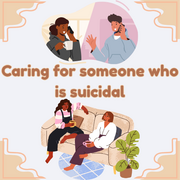He taonga rongonui te aroha ki te tangata
Compassion for others is a precious treasure
"You don't seem to be yourself lately"
"Can we talk?"
“It’s okay to talk with me about anything, and I mean that.”
"I'm gutted you're feeling this bad...”
“...I really want you to stay with us...”
“...When life has been really hard before, what’s helped you get through?"
“I want to know what’s going on for you...”
“...what you’re thinking about, or how you’re feeling”
"Is there someone you trust that we could talk to?"
"Does anyone else know about this?"
“I don’t really know what to do, but I do know that we need some help.”
“I can hear you’re in a lot of pain at the moment...”
“If I make an appointment for you and drive you there, would you talk to a counsellor?”
You might notice they:
✷ access things they could use to hurt themselves, like a rope or gun
✷ read or write about suicide online, or post photos or videos about suicide
✷ become obsessed with death
✷ become isolated or withdrawn from family, whānau and friends
✷ don't seem to be coping with any problems they may be having
✷ tell you they want to die or kill themselves
✷ have changes in mood – becoming depressed, angry or enraged
✷ hurt themselves – for example, cutting skin or taking an overdose
✷ feel worthless, guilty, whakamā or ashamed
✷ have no hope for the future
✷ use drugs or alcohol to cope with difficult feelings or thoughts
✷ lose or gain a lot of weight, or have unusual eating patterns
✷ sleep a lot more than usual, or stop getting enough sleep
✷ seem to have lost interest in life, or things they used to enjoy
✷ give away possessions, pay back debts or 'tie up loose ends'
✷ stop taking their medication
✷ suddenly seem calm or happy after they have been depressed or suicidal

